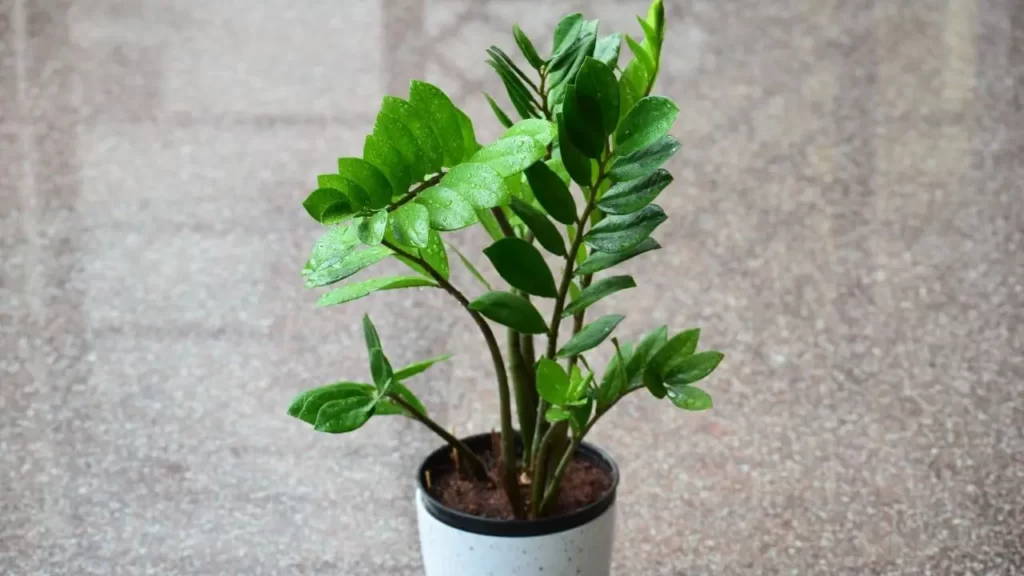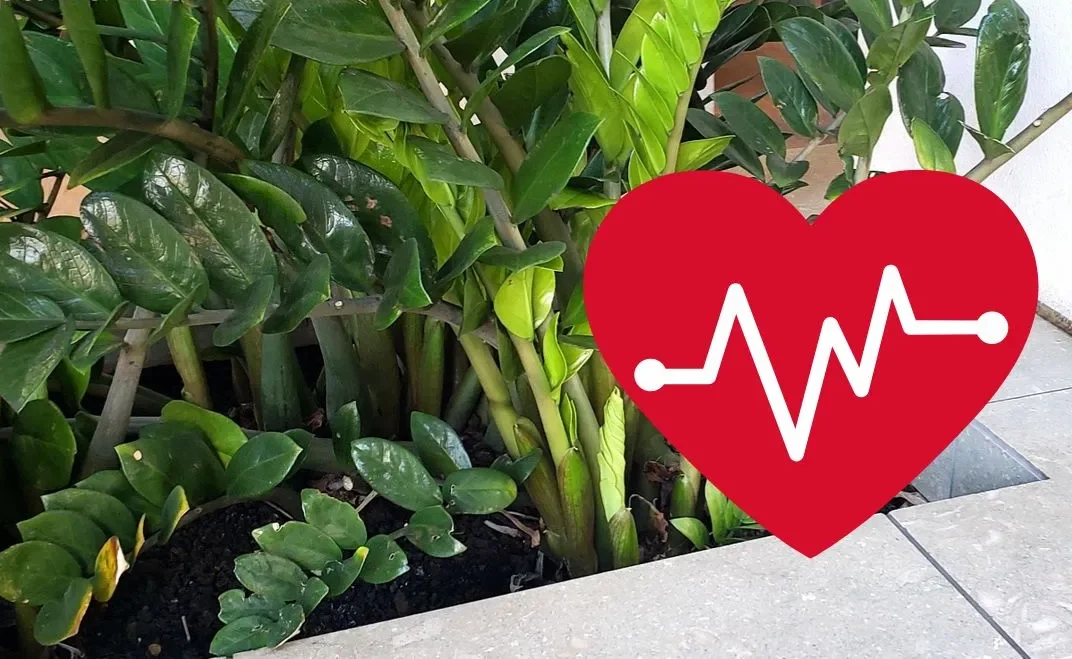The ZZ plant (Zamioculcas zamiifolia, Zanzibar Gem, Zee Zee Plant) is a popular houseplant that is admired for its unique foliage and low-maintenance requirements.
Despite being a popular choice for indoor greenery, many people have become concerned about the safety of this species after rumors began to circulate claiming that the ZZ plant can cause cancer.
In this article, we take a look at what science has to say about the potential link between ZZ plants and cancer.
Is There Any Evidence That ZZ Plants Cause Cancer?
Currently, there is no scientific evidence to suggest a direct link between having a ZZ plant in your home and developing cancer.
While it is true that when the plant’s leaves are broken or chewed they can be poisonous to humans, there is no existing research linking them with an increased risk of any type of cancer.
Additionally, it should be noted that these types of plants are generally considered safe when handled properly as long as any broken pieces are disposed of right away and all parts of the plant are kept out of reach from children or pets.
Potential Health Risks From Indoor Air Pollution
While there is not yet any research showing a direct connection between ZZ plants and cancer, other risks may be associated with having these plants indoors.
Indoor air pollution caused by poor ventilation or pollutants from household cleaners can cause health issues such as respiratory problems, headaches, and fatigue.
This has led some experts to suggest that large numbers of houseplants can act as natural air filters for your home.
Unfortunately, studies on this subject have been limited so far and more research needs to be done before we can draw any firm conclusions about the potential benefits or harms associated with having multiple houseplants indoors.

Are There Any Other Health Risks Linked To The Plant?
Besides potential indirect effects on the air quality inside your home, another concern associated with having a ZZ plant indoors is the risk posed by handling the plant without proper precautions.
When touched without gloves or other protective gear, sap from the stems or leaves can irritate the skin due to its high concentration of calcium oxalate crystals which may cause inflammation or even burns in sensitive individuals.
Additionally, ingestion of sap from these plants has been reported to cause nausea, vomiting, and diarrhea in some cases so it is important to keep all parts of these plants away from children and pets who might mistake them for food sources.

You can read details: ZZ Plant Poisonous: Is It Safe for Pets and Humans?
Should I Avoid ZZ Plant In My Home?
While there is no scientific evidence linking ZZ plants to cancer, it is important to take precautions when handling them as mentioned above.
Additionally, if you are concerned about possible air quality issues in your home due to having multiple houseplants, you should consult with an expert on the subject who can provide guidance and advice on how best to address any potential indoor air pollutants.
Taking these precautions can help ensure that you and your family remain safe and healthy while enjoying the beauty of ZZ plants in your home.

Related FAQs:
Is it true that ZZ plants can give you cancer?
There is no scientific evidence supporting the claim that ZZ plants cause cancer. While the plant’s leaves can be toxic if ingested, there’s no research indicating a direct link to cancer development.
Are ZZ plants safe to have around children and pets?
ZZ plants can be toxic if ingested, causing symptoms like nausea and vomiting. It’s crucial to keep them out of reach of children and pets to prevent accidental ingestion.
Can handling ZZ plants lead to health issues?
Handling ZZ plants without protection can cause skin irritation due to their sap’s high concentration of calcium oxalate crystals. It’s advisable to wear gloves when handling them.
Do ZZ plants improve indoor air quality?
While some experts suggest that houseplants like ZZ plants can act as natural air filters, more research is needed to confirm their effectiveness in improving indoor air quality significantly.
Should I avoid having ZZ plants in my home?
There’s no need to avoid ZZ plants based on cancer concerns alone. However, proper precautions should be taken to handle them safely, and their placement should be away from children and pets.
What are the potential health risks associated with ZZ plants?
Apart from skin irritation and toxic effects if ingested, ZZ plants don’t pose significant health risks. However, individuals with sensitivities or allergies should handle them with care.
Are there any precautions I should take when caring for ZZ plants?
When caring for ZZ plants, wear gloves to avoid skin irritation and ensure they are placed out of reach of children and pets. Regularly clean up any fallen leaves or broken parts to prevent accidental ingestion.
Can ZZ plants cause respiratory issues or headaches?
While ZZ plants themselves are not known to cause respiratory issues or headaches, poor indoor air quality from various sources can contribute to such health problems. Proper ventilation is essential for maintaining a healthy indoor environment.
Do ZZ plants require special care to thrive indoors?
ZZ plants are known for their low-maintenance requirements. They thrive in indirect light and prefer infrequent watering. Avoid overwatering, as it can lead to root rot.
Are there any alternative indoor plants that are safer than ZZ plants?
Many indoor plants are considered safe options, such as spider plants, snake plants, and pothos. However, regardless of the plant species, it’s essential to research potential toxicity and care requirements before bringing them into your home.
Can ZZ plants be harmful if their leaves are broken or chewed?
Yes, ZZ plant leaves contain compounds that can be toxic if ingested, leading to symptoms like nausea and vomiting. It’s important to promptly dispose of any broken or chewed parts and to handle the plant with care.
Do ZZ plants emit any harmful gases or chemicals?
There’s no evidence to suggest that ZZ plants emit harmful gases or chemicals. However, like all plants, they do release small amounts of carbon dioxide during the night as part of the respiration process.
Are ZZ plants suitable for individuals with allergies or sensitivities?
ZZ plants are generally considered safe for individuals with allergies or sensitivities. However, as with any plant, some people may experience reactions to the pollen or other plant components, so it’s essential to monitor for any adverse reactions.
Can ZZ plants attract pests or insects into the home?
While ZZ plants are relatively resistant to pests and insects, they can still attract certain pests like spider mites or mealybugs if not properly cared for. Regularly inspecting the plant for signs of infestation and taking appropriate measures can help prevent pest problems.
Do ZZ plants have any positive effects on mental health or well-being?
While there’s limited research specifically on ZZ plants, many studies suggest that interacting with indoor plants can have positive effects on mental health, such as reducing stress and improving mood. Enjoying the presence of ZZ plants in your home can contribute to a sense of well-being and connection to nature.
Can ZZ plants survive in low-light conditions?
Yes, ZZ plants are known for their ability to thrive in low-light conditions, making them suitable for areas of the home with minimal natural light. However, they may grow more slowly in low-light environments compared to areas with brighter light.
Are ZZ plants prone to any diseases?
ZZ plants are relatively resistant to pests and diseases, but they can be susceptible to root rot if overwatered. To prevent root rot, allow the soil to dry out between waterings and ensure the plant is not sitting in water.
Can ZZ plants be propagated easily?
Yes, ZZ plants can be propagated through division or by planting leaf cuttings. Division involves separating the plant into smaller sections with roots, while leaf cuttings can be rooted in water or soil to grow new plants.
Do ZZ plants have any cultural or symbolic significance?
In some cultures, ZZ plants are believed to bring good luck, prosperity, and fortune to the home. They are often associated with traits like resilience and endurance due to their ability to survive in various conditions with minimal care.
Are ZZ plants suitable for offices or other indoor workspaces?
Yes, ZZ plants are popular choices for offices and indoor workspaces due to their low-maintenance requirements and ability to tolerate low-light conditions. They can add a touch of greenery to any indoor environment while requiring minimal attention.
Are ZZ plants toxic?
Yes, the sap of ZZ plants is considered toxic and can cause irritation or burns when touched without proper protective gear.
Ingestion of sap from these plants has been reported to cause nausea, vomiting, and diarrhea in some cases so it is important to keep all parts of these plants away from children and pets who might mistake them for food sources.
Are ZZ plants good for air quality?
Some experts suggest that having multiple houseplants can act as natural air filters for your home.
Unfortunately, studies on this subject have been limited so far and more research needs to be done before we can draw any firm conclusions about the potential benefits or harms associated with having multiple houseplants indoors.
It is also important to note that poor ventilation or pollutants from household cleaners can contribute to air quality problems as well.
Therefore, it is important to take proper precautions when dealing with both the plant and its environment.
What precautions should be taken when handling a ZZ plant?
When handling the plant without proper protective gear, sap from the stems or leaves may cause skin inflammation or even burns in sensitive individuals.
Additionally, ingestion of sap from these plants has been reported to cause nausea, vomiting, and diarrhea in some cases so it is important to keep all parts of these plants away from children and pets who might mistake them for food sources.
It is also important to wear gloves when handling the plant and dispose of any broken pieces right away. Lastly, it is important to ensure that the plant’s environment is well-ventilated and free from pollutants.
Conclusion
With no scientific evidence linking them directly to an increased risk for cancer development and potential health risks posed by their possible contribution towards indoor air pollution levels still largely unknown, it appears that owning a ZZ Plant does not pose any immediate threat to human health.
However, due caution should still be exercised when handling these plants as their sap can cause skin irritation if touched directly.
In addition, keeping all parts of the plant out of reach from children or animals will help reduce the risk posed by accidental ingestion.
Finally, regular maintenance of indoor air quality through proper ventilation will help ensure a healthy living environment whether you choose to bring one into your home or not.

